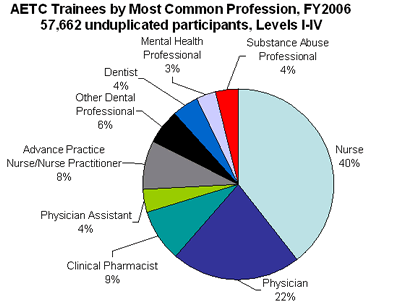|
The
AIDS Education and Training Centers
(AETCs) Program is a network of regional
and national centers that train health
care providers to treat persons with
HIV/AIDS. As the clinical training component
of the Ryan White Program, AETCs seek
to improve health outcomes of people
living with HIV/AIDS through training
on clinical management of HIV disease
in such areas as use of antiretroviral
therapies and prevention of HIV transmission.
During the 2005-2006 grant year, more
than 118,760 participants attended AETC
training events. The program targets
providers who treat minority, underserved,
and vulnerable populations in communities
most affected by the HIV epidemic.
Focus
of Provider Training
Innovative training methods-skill-building
workshops and clinical practice placements-augment
traditional didactic education. AETCs
also provide clinical consultation
and decision support to clinicians
regarding care and the use of antiretroviral
therapies and technical assistance
in improving service delivery at the
organizational level.

[D]
|
|
- Training
targets health care providers who serve
minority populations, the homeless, rural
communities, incarcerated persons, and
Ryan White-funded sites.
- The
AETCs focus on training a clinical core
of physicians, physician assistants, nurses,
nurse practitioners, dentists, pharmacists,
as well as other paraprofessionals.
- Training
activities are based upon assessed local
needs.
- Emphasis
is placed on interactive, hands-on training
and clinical consultation to assist providers
with complex issues related to the management
of highly active antiretroviral therapy.
- The
AETCs collaborate with Ryan White-funded
organizations, area health education centers,
community-based HIV/AIDS organizations,
community and migrant health centers,
and medical and health professional organizations.
- Clinicians
trained by AETCs have been shown to be
more competent with regard to HIV issues
and more willing to treat persons living
with HIV than other primary care providers
AETC
Training Network
AETC training is through a network of
11 regional centers (and over 130 local
performance sites) serving the nation. Four
national centers also support this network
of provider training through sharing of
resources and training strategies.
- The
11 Regional AETCs serve
multi-state areas, covering all 50 States,
the District of Columbia, the Virgin Islands,
Puerto Rico, and the six U.S. Pacific
Jurisdictions. Their focus is on rapid
dissemination of state-of-the-art information
on HIV clinical management by linking
HIV expertise from academic and highly
skilled community HIV clinicians and/or
tertiary level medical institutions to
front line HIV clinical care providers
who serve minority and disproportionately
affected populations.
- AETC National Resource Center (NRC)
disseminates training resources and the
latest HIV clinical information across
the family of AETCs via such venues as
the NRC website, which is a central repository
of AETC training materials, best practices,
and contact information.
- National HIV/AIDS Clinicians' Consultation
Center (NCCC) provides health care
providers with timely and appropriate
responses to clinical questions related
to treatment of persons with HIV infection.
Components include the following:
- National
HIV Telephone Consultation Service (Warmline)
(800-933-3413) offers physicians and
other health care providers with answers
to routine HIV management questions.
- National
Clinicians' Post-Exposure Prophylaxis
Hotline (PEPline) (888-448-4911) offers
treating clinicians around-the-clock
advice on managing occupational exposures
(e.g., needlesticks, splashes) to HIV,
hepatitis, and other blood-borne pathogens.
- National
Perinatal HIV Consultation and Referral
Service (Perinatal Hotline) ( 888-448-8765)
provides 24-hour clinical consultation
and advice on perinatal transmission,
counseling and testing, prophylaxis,
and perinatal patient management.
- National Minority AETC (NMAETC) builds
capacity for HIV care and training among
minority health care professionals and
health care professionals serving communities
of color.
- National AETC Evaluation Center is
responsible for program evaluation activities,
including assessing the effectiveness
of AETCs grantees education, training,
and consultation activities.
In
addition to these AETC activities, HRSA 's
HIV/AIDS Bureau supports international health
care provider training through the International
Training and Education Center on HIV (Not
a U.S. Government Web site). I-TECH promotes
activities that increase human capacity for
providing HIV/AIDS care and support in countries
and regions hardest hit by the AIDS epidemic.
|
|